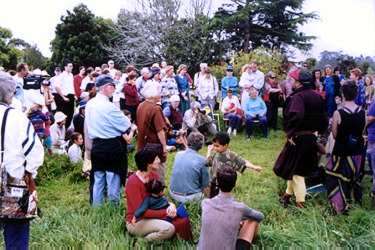|
Home Page Editorial
Summer 2001
For me the new year has brought something of a stand-back-and-look
at the big picture. I've been reading a book by Ray and Anderson
(2000), entitled Cultural
Creatives: How 50 million people are changing the world.
Their message is that the madness of modernity which we see (mostly)
all around us, is in fact now hanging by a thread with something
like only 51% of Americans still subscribing to the 'more is better-climb
the ladder value-exploit the earth' value system. The recent US
presidential election was perhaps a bit of a symbol of this trend.
A growing subculture of people are becoming dedicated to the environment,
consciousness, relationships and community, and these 'creative'
people now make up a staggering 26% of the US population. The authors
see this as the beginning of a fundamentally new culture which brings
hope for us as a species in a world that is currently stressed and
near practical limits. Worth a read.
In the Eco-Village world it was Bill
Mollison who articulated quite early on that a million eco-villages
is one of the things the world needs most urgently. This is abruptly
juxtaposed against modernity's admiration of big cities and its
technologies which will overcome resource limitations. However new
villages as with a new culture take time, and there is much to be
learnt, with little but our own hearts and minds to guide us.
In celebrating the stepping stones and successes this quarter I
want to mention about Earthsong Eco-Neighbourhood's recent groundbreaking.
After more than 5 years in planning, construction of its 32 homes
has now begun. This is a neighbourhood which is being built mostly
at once as compared with a lot style development, and utilises rammed
earth construction, and a extensive collection of innovative services.
While it can be argued that 30 homes does not a village make, as
a building block it is a huge effort indeed involving significant
dedication and cooperation. You can see some photos on their website
Other notable successes are Valley
Farm who have managed to renegotiate their purchase agreement
and retain a magnificent piece of land. Also the Auckland Housing
Association has finally stitched up a very favourable deal with
the Auckland City Council who have financed around 15% for the 100
or more Freemans Bay ex council houses. The Public Trust has funded
the balance and Kimberly from AHA reports that this is a milestone
in bank funding, where a group has essentially been loaned
the millions of dollars to buy the houses and all without separate
freehold titles.
Around summer solstice I visited Tui
in GoldenBay, which was a real inspiration in terms of how a local
community of people can function successfully both in terms of practical
governance and management and in terms of a sustainable egalitarian
social system, which embodies relating skilfully and respectfully
honouring each individual and in wondrous celebration of the seasonal
transitions. Robina McCurdy from Tui is doing some really great
work in the organic/PC/ecovillage education front, among other things
establishing a 1 year training course for local youth. (Dont forget
the 4 week Designing
Sustainable Communities course in Feb 26)
My other inspiration from the Nelson region was the thoughtful,
long ahead of its time, way the Riverside
village is laid out. Way back in the Ecovillage darkages (c1940s)
a young architectural student devised an almost by the book cohousing
plan for the community. The plan was for the most part implemented
and to this day remains probably only one of a couple of NZ's older
intentional communities that was built on a clustered basis. As
a planner I was interested in how they got around the one house
per 40 acre philosophy prevalent both then and still largely now.
In the beginning they had to get a number of 'departures' as resource
consents were known in those days to build each new house. After
that they simply got the rural land rezoned residential and commercial!
and in fact the houses are still on one title. The common agricultural
land surrounds just as it was with the successful medieval open
field villages.
A couple of bits to wrap up. A handy little book entitled Ecovillages
in NZ and Australia has come out which is available from GEN
Oceania. Also from GEN their Millennium
Newsletter is definitely worth a read if you haven't got
to it -- a great catch up with the global ecovillage scene. The
NZ Sustainable Land Development Handbook has
gone out to council consultation stage and public release is expected
to be in March of this year. We are hopeful that councils will take
some ownership of this work to enable a set of national design standards
and recognised solutions for would-be ecovillagers and thoughtful
developers etc. On the developers theme I should mention Nelson's
Silkwood which is a new NZ equivalent of Australia's Kookaburra
Park. Interesting use of freehold titles and common garden areas.
Lastly it feels worth reiterating that IMHO Gilman / Context Institute
(1991), Eco-Villages and Sustainable Communities is still
the authority on ecovillage development. I think it is still
available or try library interloan. And a few more websites
for the latenight owls... Envirolink,
CentralWonan,
Idealist, ILSR,
Damanhur
Till Autumn,
Peter Scott :-)
 |
|
Earthsong Eco-Neighbourhood:
Turning the sod ceremony.
Nov 2000
|
|







